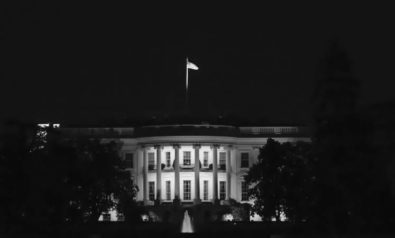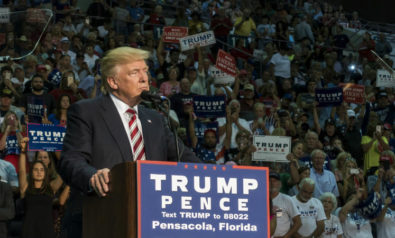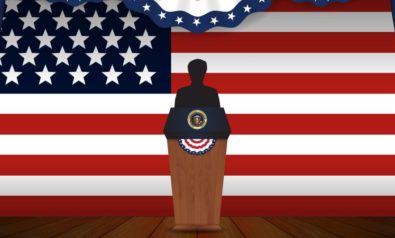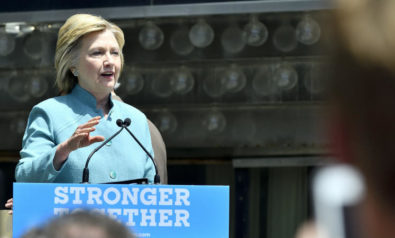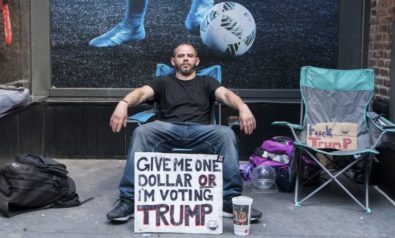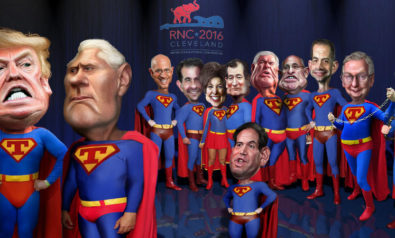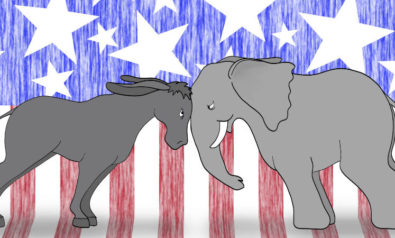Only the intellectual empowerment of Americans can stem the tide of distracting voters from real policies, says Naomi Wolf.
The success of extremes in America’s political scene speaks, these days, to how dispossessed and voiceless many Americans now feel. A new edition of an important citizen’s guide and handbook—Jessamyn Conrad’s What You Should Know About Politics… But Don’t—explains why.
Some of the issues that are surfacing again and again in our news stream in 2016 are directly interlocking. They deal with issues of personal freedom and constitutional rights versus national security claims. Usually, these themes are reported upon as “symptoms.” For example, a protest in Detroit within the Black Lives Matter movement is reported as if it is a discrete event. The controversy over Edward Snowden’s revelations is reported as if that is simply the story of an individual making controversial individual choices.
The reportage is often personalized. Accounts of Islamic State (IS) incursions in Iraq or threats reported from IS in the United States or in western Europe are reported separately as well.
But by showing how interests are aligned or in conflict and result in legislation, this book reveals how many of these themes have common origins. How? Because a vast national security structure has been set in place with immense, and often nontransparent, funding from government sources (as well as huge profits from the private sector) with interest in militarizing domestic police forces, which in turn results in more violent crackdowns against protesters and—it is reasonable to assume—a more aggressive policing policy, less overall respect for individual civil liberties, and more black lives lost to police violence.
Is profit part of this militarization of policing and this criminalization of civic action?
The US leads the world in imprisoning its citizens, as Michelle Alexander’s The New Jim Crow revealed. Immense profits are being generated by the prison industry, and the lobbyists for those interests actually require a certain conviction-rate commitment from elected officials before they will build prisons and fill them. Black lives matter less and less as the profit motive for locking up our fellow citizens—whose conviction rates have been proven to be higher than those of Caucasians accused of parallel crimes—escalates.
Some recent legislation, such as the Federal Prison Industries Competition in Contracting Act, shows how profitable the private incarceration sector is.
The same rise of the national security state turns a whistleblower (or traitor, depending on your perspective) such as Snowden into a lifelong fugitive. An acquittal such as that won by Daniel Ellsberg in the 1970s after leaking the Pentagon Papers—which were interpreted as being in the national interest to reveal—is entirely unlikely today. Even the IS threat must be assessed critically in the context of these vast billions that are flowing into the coffers of stakeholders in the national security apparatus, since a new global threat, real as it may be, generates even more profit by being over reported. A bill for border security details the potential of these many millions to flow to the private sector—that is, if fear and fear reportage do their work.
Media Reporting
But these pressures distort news stories. Reports from both the left and the right, ranging from The Guardian to Reason, are finding that government agencies and private security companies, at times amplifying each other’s efforts—as the FBI has pointed to releases from the highly unreliable private syndicator SITE Intelligence—are exaggerating or hyping up terror threats to news outlets, which often reprint assertions from these sources uncritically. In the US, a number of key claims by the FBI about “terror cells,” as I reported in The End of America, have fallen apart upon further press scrutiny, when it became clear that many cases involved confused drifters entrapped by the authorities.
Fueling more of this kind of legislation that benefits the few stakeholders and their lobbyists, instead of reflecting the needs of voters, is the Supreme Court decision, Citizens Unite. Now, it is difficult for even the best-intentioned elected official to listen more to his or her constituents rather than the lobbyists who will fund his or her next campaign.
What You Should Know About Politics… But Don’t spells out this corruption. A billion dollars was spent in the last presidential cycle. So we are witnessing an increase in legislation that results in greater benefit for the few who can spend heavily on lobbying. This has strengthened the income inequality that commentators such as Robert Reich report.
Election Cycle
Some of the issues that are emerging in the present election cycle, such as the passage of health care reform or Obamacare (depending on where you sit ideologically), run counter to the overall trend of the consolidation of power in fewer hands. Other currents, such as the development of green energy and the growing awareness of the seriousness of the environmental crisis, also pose challenges to this general trend.
Solving the crisis posed by global warming will involve communitarian rather than us-versus-them thinking. While the need for laws reducing carbon emissions is clear, the same obstacles to such legislation—the concentration of power in the hands of lobbyists, including those for the oil industry—stands in the way.
The direct challenges posed by climate change strongly suggest the urgent need for organizations that seek to empower voters in spite of lobbyists and special interests. A network of such civically oriented entities is now coalescing. These groups and resources range from Civic Hall in New York, a venture that houses many of the emerging civic tech startups, to nonprofit organizations such as the Sunlight and the Maplight Foundation, to a series of grassroots citizen movements.
Civic Tech is actually a fast-growing place in the digital ecosystem. These also include the much-harassed Occupy movement, now largely cordoned off; Black Lives Matter activists; and anti-surveillance leaders, such as those at the Electronic Frontier Foundation. Combined, these constitute the movement of our time.
It is clear that the old left-versus-right duality, the lens through which we have been asked to view American politics, is really dead—or rather, that we can now see that it is a distraction. The understanding that we are in a time in which the real conflicts are not conservative versus liberal, but the many against the few is far more widespread. When culture-war issues, such as gay marriage or native-born Americans versus immigrants are thrown out into the electorate, many more sophisticated voters on all sides of the political spectrum are aware that these issues are trotted out in election years to ramp up the appearance of differences between the parties.
In reality, both are largely beholden—albeit in different proportions—to the Big Six, the major special interests: what I call War Inc. (and its emerging major subsidiary, Fear Inc., or the global surveillance and security industry); Big Pharma; Big Insurance; Big Oil; Big Agriculture; and Wall Street. We can probably add Big Incarceration to that list now.
Real Plans for Real Issues
Smart voters realize that whatever their political beliefs, it is those who don’t hold power in these major industries—that is, all the rest of us: teachers and nurses, cops and factory workers, new immigrants and small business owners, the unemployed, the retired, veterans, the plain old middle and working class—who, whatever our views on abortion or gay marriage or bilingualism or gun ownership, are getting screwed. The only way for such outsiders as the rest of us to regain our seats at the table is through understanding what is going on behind the curtain.
Also in line with this shift from left-versus-right framing to a re-centering of debate around decisions stressing individual choice is the action taken by Congress to cede federal authority over much of education. George W. Bush’s No Child Left Behind Act, for example, was replaced with the Every Student Succeeds Act, which gives states back much of their former influence in schools’ curricula.
As I write, we are in the midst of a political campaign. Conrad’s book explains why the discussion has migrated so far from political campaigns in the 1980s and early 1990s. That was the era before the Great Divide: the cleaving of the nation and its public servants into the haves and the have-nots. Before the Citizens United decision, presidential and congressional campaigns were substantially more centered on the issues that really affected ordinary people.
I remember when presidential candidates spoke about their real plans for real policies around infrastructure or investment in training; about tax cuts for ordinary people or plans to revitalize industry or grow new industries; about how to help small businesses thrive or whether to build more mass transit; and how to deal with delivering more nutritious school lunches.
Today, a third of political debate on the national stage is about IS, which is a subject the average citizen can do nothing about, and a third is anti-immigration rhetoric—a subject guaranteed to divide and distract the electorate without burning up any real political capital with special interests. The balance is outrage over gay rights or perhaps gun ownership, or abortion and Planned Parenthood or other culture-war hot-button talking points.
While strong feelings and fierce beliefs definitely attached to these themes, the fact is that no major candidate is going to burn up any political capital with the rich folks who write the checks by focusing on demand for real reforms rather than keeping voters distracted by such volatile issues. It is a fantastic sleight of hand, but America is far the worse for it.
In this climate, only the intellectual empowerment of citizens can stem this tide.
The views expressed in this article are the author’s own and do not necessarily reflect Fair Observer’s editorial policy.
Photo Credit: Allen G. / Shutterstock.com
 We bring you perspectives from around the world. Help us to inform and educate. Your donation is tax-deductible. Join over 400 people to become a donor or you could choose to be a sponsor.
We bring you perspectives from around the world. Help us to inform and educate. Your donation is tax-deductible. Join over 400 people to become a donor or you could choose to be a sponsor.
Support Fair Observer
We rely on your support for our independence, diversity and quality.
For more than 10 years, Fair Observer has been free, fair and independent. No billionaire owns us, no advertisers control us. We are a reader-supported nonprofit. Unlike many other publications, we keep our content free for readers regardless of where they live or whether they can afford to pay. We have no paywalls and no ads.
In the post-truth era of fake news, echo chambers and filter bubbles, we publish a plurality of perspectives from around the world. Anyone can publish with us, but everyone goes through a rigorous editorial process. So, you get fact-checked, well-reasoned content instead of noise.
We publish 2,500+ voices from 90+ countries. We also conduct education and training programs
on subjects ranging from digital media and journalism to writing and critical thinking. This
doesn’t come cheap. Servers, editors, trainers and web developers cost
money.
Please consider supporting us on a regular basis as a recurring donor or a
sustaining member.
Will you support FO’s journalism?
We rely on your support for our independence, diversity and quality.


















